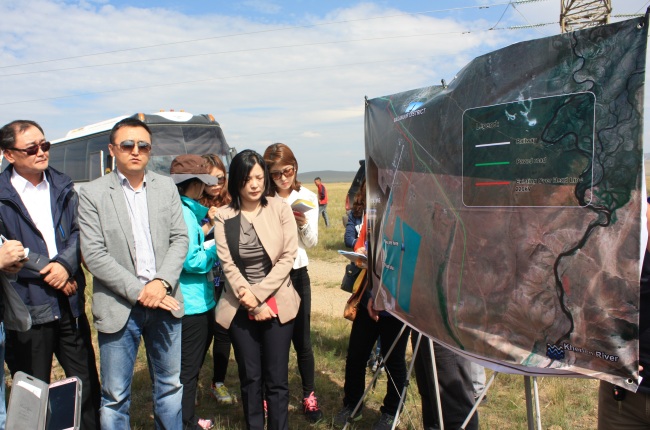POSCO starts Mongolia energy projects
ULAN BATOR ― POSCO, the nation’s top steelmaker, is stepping up business development in non-steel areas in mineral resource-rich Mongolia. The energy business, along with materials, is a new growth engine for POSCO.
In a press conference held in Ulan Bator last week, POSCO unveiled the detailed plan to build a coal-to-liquid plant, which converts coal to liquid fuel, in Baganuur, a city about 150 kilometers northeast of Ulan Bator. POSCO developed the plan with local partner MCS Group, the largest conglomerate in Mongolia.
“POSCO and MCS completed a feasibility study for the $2 billion project and set up a 50:50 joint venture firm called Baganuur Energy Corp. We are expecting to break ground to build the CTL plant next year after financing the project,” said Won Gang-hee, general manager of POSCO’s Mongolian office.
The Mongolian government has supported POSCO’s CTL project as it will produce less carbon dioxide than the existing coal-powered plants and will cut imports of petroleum from Russia, Won said.
When the CTL plant is completed around 2018, it will produce 450,000 tons of diesel oil and 100,000 tons of dimethyl ether per year.
“The plant-building project appeals to POSCO in terms of profitability. Along with the fast-growing economy, Mongolia’s oil consumption is forecast to rise to 3.5 million tons by 2020 from last year’s 800,000 tons,” Won added.
Besides the CTL project, POSCO also will enter the power generation business in Mongolia. A consortium led by POSCO Energy, an affiliate of the steel company, was named a preferred bidder for a 1.5 trillion won ($1.34 billion) thermal power plant project in Mongolia on Aug. 26 after beating another consortium led by Samsung C&T and Korea Southern Power.
“The POSCO-led consortium will build a 450-megawatt coal-powered power plant by 2017 and it will also be responsible for the plant operation for 25 years once construction is completed,” the company said in a press release.
If the two plant projects are wrapped up successfully, the steelmaker expects the company will be able to create more business opportunities in many areas of fast-growing Mongolia. The Mongolian economy, fueled by mineral resources, grew about 9 percent on average annually for the past decade between 2002 and 2012.
The mineral resource-rich country is one of the most strategically important Asian countries for POSCO, along with Vietnam, Laos and India. In particular, Mongolia boasts gigantic coal reserves. There are more than 300 coal mines in 15 regions throughout Mongolia, putting it among the world’s top 10 coal producers.
“POSCO expects it will find a variety of business opportunities in Mongolia’s steel and non-steel areas, including the energy and infrastructure-building sectors, while contributing to the country’s industrialization,” a POSCO official said.
By Seo Jee-yeon, Korea Herald correspondent
(jyseo@heraldcorp.com)
In a press conference held in Ulan Bator last week, POSCO unveiled the detailed plan to build a coal-to-liquid plant, which converts coal to liquid fuel, in Baganuur, a city about 150 kilometers northeast of Ulan Bator. POSCO developed the plan with local partner MCS Group, the largest conglomerate in Mongolia.
“POSCO and MCS completed a feasibility study for the $2 billion project and set up a 50:50 joint venture firm called Baganuur Energy Corp. We are expecting to break ground to build the CTL plant next year after financing the project,” said Won Gang-hee, general manager of POSCO’s Mongolian office.
The Mongolian government has supported POSCO’s CTL project as it will produce less carbon dioxide than the existing coal-powered plants and will cut imports of petroleum from Russia, Won said.
When the CTL plant is completed around 2018, it will produce 450,000 tons of diesel oil and 100,000 tons of dimethyl ether per year.
“The plant-building project appeals to POSCO in terms of profitability. Along with the fast-growing economy, Mongolia’s oil consumption is forecast to rise to 3.5 million tons by 2020 from last year’s 800,000 tons,” Won added.
Besides the CTL project, POSCO also will enter the power generation business in Mongolia. A consortium led by POSCO Energy, an affiliate of the steel company, was named a preferred bidder for a 1.5 trillion won ($1.34 billion) thermal power plant project in Mongolia on Aug. 26 after beating another consortium led by Samsung C&T and Korea Southern Power.
“The POSCO-led consortium will build a 450-megawatt coal-powered power plant by 2017 and it will also be responsible for the plant operation for 25 years once construction is completed,” the company said in a press release.
If the two plant projects are wrapped up successfully, the steelmaker expects the company will be able to create more business opportunities in many areas of fast-growing Mongolia. The Mongolian economy, fueled by mineral resources, grew about 9 percent on average annually for the past decade between 2002 and 2012.
The mineral resource-rich country is one of the most strategically important Asian countries for POSCO, along with Vietnam, Laos and India. In particular, Mongolia boasts gigantic coal reserves. There are more than 300 coal mines in 15 regions throughout Mongolia, putting it among the world’s top 10 coal producers.
“POSCO expects it will find a variety of business opportunities in Mongolia’s steel and non-steel areas, including the energy and infrastructure-building sectors, while contributing to the country’s industrialization,” a POSCO official said.
By Seo Jee-yeon, Korea Herald correspondent
(jyseo@heraldcorp.com)

Comments
Post a Comment